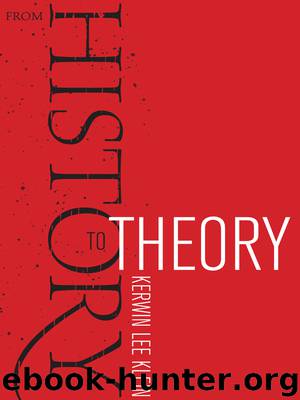From History to Theory by Klein Kerwin Lee

Author:Klein, Kerwin Lee
Language: eng
Format: epub
Publisher: University of California Press
FIVE
On the Emergence of Memory
in Historical Discourse
Welcome to the memory industry.1 In the grand scheme of things, the memory industry ranges from the museum trade, to the legal battles over repressed memory, and to the market for academic books and articles that invoke memory as a keyword. Our scholarly fascination with things memorable is quite new. As Jeffrey K. Olick and Joyce Robbins have noted, “collective memory” emerged as an object of scholarly inquiry only in the early twentieth century, contemporaneous with the so-called crisis of historicism. Hugo von Hofsmannsthal used the phrase “collective memory” in 1902, and in 1925 Maurice Halbwachs, in The Social Frameworks of Memory, argued, against Henri Bergson and Sigmund Freud, that memory is a specifically social phenomenon. But outside of experimental psychology and clinical psychoanalysis, few academics paid much attention to memory until the great swell of popular interest in autobiographical literature, family genealogy, and museums that marked the seventies.2
The scholarly boom began in the 1980s with two literary events: Yosef Yerushalmi's Zakhor: Jewish History and Jewish Memory (1982) and Pierre Nora's “Between Memory and History,” the introduction to an anthology, Les lieux de mémoire (1984). Each of these texts identified memory as a primitive or sacred form opposed to modern historical consciousness. For Yerushalmi, the Jews were the archetypal people of memory who had adopted history only recently and then only in part, for “modern Jewish historiography can never replace an eroded group memory.” For Nora, memory was an archaic mode of being that had been devastated by rationalization: “We speak so much of memory because there is so little of it left.” Despite or perhaps because of their elegiac tone and accounts of memory as antihistorical discourse, these works found an amazing popularity and were quickly joined by others. In 1989 the translation of Nora's influential essay in a special issue of the journal Representations, and the founding of History and Memory, based in Tel Aviv and Los Angeles, showed the crystallization of a self-conscious memory discourse. A decade later, the scholarly literature brimmed with such titles as “Sites of Memory” or “Cultural Memory” or “The Politics of Memory.”3
The emergence of memory as a keyword marks a dramatic change in linguistic practice. We might be tempted to imagine the increasing use of memory as the natural result of an increased scholarly interest in the ways that popular and folk cultures construct history and the past. Such a reading would be too hasty. For years, specialists have dealt with such well-known phenomena as oral history, autobiography, and commemorative rituals without ever pasting them together into something called “memory.” Where we once spoke of “folk history” or “popular history” or “oral history” or “public history” or even “myth,” we now employ “memory” as a metahistorical category that subsumes all these various terms. Indeed, one of the salient features of our new memory talk is the tendency to make fairly sweeping philosophical claims for memory, or even to imagine memory discourse as part of what is vaguely hailed as the rise of theory in departments of literature, history, and anthropology.
Download
This site does not store any files on its server. We only index and link to content provided by other sites. Please contact the content providers to delete copyright contents if any and email us, we'll remove relevant links or contents immediately.
| Archaeology | Essays |
| Historical Geography | Historical Maps |
| Historiography | Reference |
| Study & Teaching |
Underground: A Human History of the Worlds Beneath Our Feet by Will Hunt(12057)
Sapiens by Yuval Noah Harari(5332)
Navigation and Map Reading by K Andrew(5135)
The Sympathizer by Viet Thanh Nguyen(4348)
Barron's AP Biology by Goldberg M.S. Deborah T(4124)
5 Steps to a 5 AP U.S. History, 2010-2011 Edition (5 Steps to a 5 on the Advanced Placement Examinations Series) by Armstrong Stephen(3711)
Three Women by Lisa Taddeo(3395)
Water by Ian Miller(3159)
The Comedians: Drunks, Thieves, Scoundrels, and the History of American Comedy by Nesteroff Kliph(3058)
Drugs Unlimited by Mike Power(2568)
A Short History of Drunkenness by Forsyth Mark(2262)
DarkMarket by Misha Glenny(2195)
The House of Government by Slezkine Yuri(2181)
And the Band Played On by Randy Shilts(2170)
The Library Book by Susan Orlean(2053)
Revived (Cat Patrick) by Cat Patrick(1977)
The Woman Who Smashed Codes by Jason Fagone(1947)
Birth by Tina Cassidy(1886)
The Absolutely True Diary of a Part-Time Indian by Sherman Alexie(1883)
